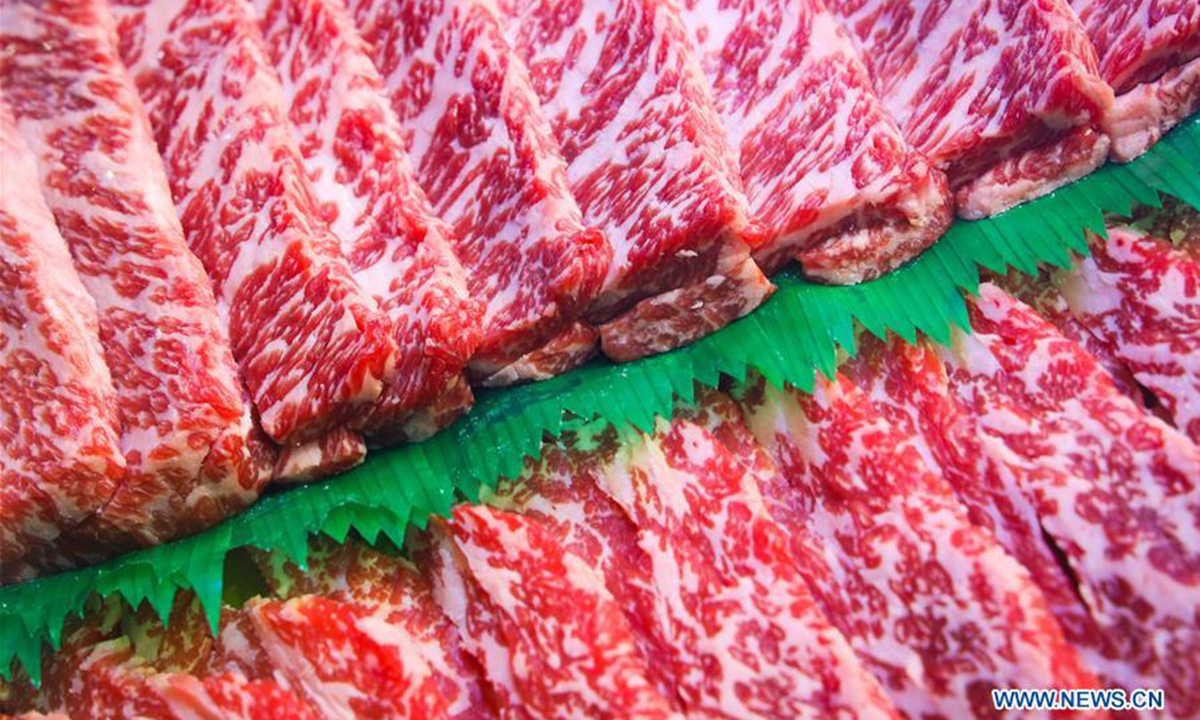China suspends exports from a fifth Aussie abattoir, additive issues worth attention: analyst
By Chu Daye Source: Globaltimes.cn Published: 2020/8/28 14:11:44

Photo taken on Nov. 7, 2018 shows beef from Australia at the Food & Agricultural Products area during the first China International Import Expo (CIIE) in Shanghai, east China. Various food from all over the world are exhibited in the CIIE. (Photo: Xinhua)
China's customs authority announced that major Australian abattoir John Dee will be forced to stop selling its meat products to China following the discovery of banned "antibiotic residue" in some products, causing Chinese analysts to suggest that more attention be taken over the quality of meat imports.
John Dee has become the fifth abattoir from Australia to have their exports suspended to China, after Chloramphenicol — a banned antibiotic in both countries — was found in some of its products, read a notice by the General Administration of Customs.
The notice came soon after the Morrison administration in Australia floated a plan that could give the Australian Foreign Ministry the power to veto the Belt and Road Initiative (BRI) deal reached between the Australian state of Victoria and China.
The cargo was destroyed while outside the Chinese border and the company was asked to provide a report into the matter to the Chinese authority within 45 days, following a thorough investigation.
The discovery followed the Australian federal government's plan to refuse to allow state agreements it deems not in the country's "national interest."
The incident, however, can hardly been seen out of the context of rising trade frictions amid continuously worsening bilateral ties.
Australia's Agriculture Minister David Littleproud described chloramphenicol as a "naturally occurring element."
Australian Meat Industry Council chief executive officer Patrick Hutchinson said such situations regularly occur in the trading of red meat and the incident "would not be news if China was not involved," according to a report by Queensland Country Life, an industry website in Australia.
However, Yu Lei, chief researcher at the Research Center for Pacific Island Countries with Liaocheng University, said Australia's downplaying of quality issues could be an attempt to save its reputation and contain spillover effects to other export markets.
"Chloramphenicol is bad for humans and any potential food safety issues cannot be neglected," Yu told the Global Times on Friday.
"Despite some people's claims, adding antibiotic additives in animal feed in large-scale animal husbandry is not uncommon," Yu said. "Australia also exports significant amounts of beef to countries such as Indonesia and Singapore."
In May, four Australian abattoirs were suspended from selling to China due to quality issues. The four exported a total of 122,000 tons of meat to China in 2019, representing about 35 percent of the total amount of beef exports to China.
Australian beef trade had been on track to reach US$3.5 billion this year, according to media reports.
John Dee abattoir sells about 30-40 percent of its beef to China, according to a report by abc.net.
In addition to the suspension of exports by the four Australian abattoirs, China also imposed 80-percent anti-dumping tariffs on Australian barley after a year-long investigation.
China also started a probe into Australia's wine exports due to dumping allegations raised by Chinese wine makers last week.
Posted in: MARKETS,BIZ FOCUS